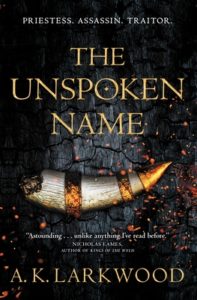
Like many of my reads during this summer’s extended Hugo voting window, A.K. Larkwood’s debut epic, The Unspoken Name, is a book that I’ve seen widely praised, but not a book that moved to the top of my list until Larkwood’s nomination for Best New Author. But I do like epic fantasy, so between that and positive reviews from other readers with similar tastes, I went into this one with plenty of optimism.
Like many epic fantasy novels, a high-level plot summary doesn’t give a great sense of what to expect. Csorwe (rhymes with “doorway”) is an Oshaaru (an orc by another name) dedicant to a Nameless death god, bound for death in ritual sacrifice until an elfin wizard brings her away to assist him in his search for a relic of great power. That search remains a focal point throughout the novel, although in the manner of epic fantasy, subplots tend to multiply.
The Unspoken Name seems to have a reputation as a slow-starter—not unusual for the subgenre—but in an ironic twist, it seems to be the unusually fast plot progression that yields such an impression. The first quarter of the book contains enough plot for a novel in its own right, and the story constantly pushed forward when I was expecting it to linger. I didn’t find this especially noisome, but neither did I sink too deeply into Csorwe’s world.
It was in the second section, which opened with a time skip, a location change, and the introduction of a new point-of-view character, that I really became invested in the story. The hunt for the relic still featured heavily, but the setting pressed much more deeply on my attention, and the new characters added an emotional depth that gave the main plot a much-needed further dimension.
But after the midway climax, I found myself again fading away. That fade has made this a difficult book to review, because I can’t point to any particular flaw in the narrative. There were no major plot holes or slowdowns, nor failures of prose or character development. It just…got less compelling.
The second-half slump is something I’ve hit before in epic fantasy, where the build-up all seems reasonably interesting but never really hits that next level of investment that makes the emotional payoffs worthwhile. And it is sometimes hard to point to a particular flaw—tastes vary (and my tastes run hard against gods squabbling through mortal intermediaries, which certainly does come up here), and reading mood can also play a non-negligible role in whether a story lands (full disclosure: I read this during an absolutely exhausting week of real life–that may be a real factor). But it also makes it hard to review, and I feel bad pinning a mediocre rating to a book that I had enjoyed for a while and for which I can’t identify any glaring flaws that lost me.
Overall, it’s a well-written epic fantasy with a few interesting subversions of classic genre tropes. If you like epic fantasy and don’t mind warring gods, it’s worth a look, but it ultimately wasn’t for me.
Recommended if you like: epic fantasy, orc leads, involved deities.
Can I use it for Bingo? It’s definitely hard mode for Revenge-Seeking Character and Debut, there’s enough sci-fi to suggest a Genre Mashup (although the feel is fantasy), it has Chapter Titles, and it’s a Book Club book.
Overall rating: your mileage may vary out of 20. Okay, okay, for completeness sake, 13 of Tar Vol’s 20. Three stars on Goodreads.
